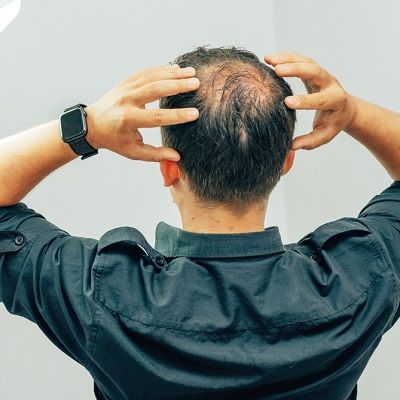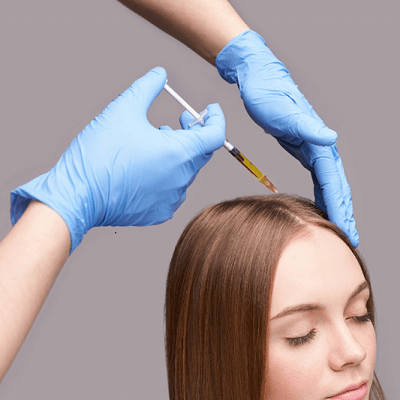
Introduction:
Hair loss in men usually begins at the crown of the head, leaving a horseshoe appearance across the back and sides. The donor sites are the regions where the hair remains. This hair has ‘donor dominance,’ meaning it is genetically hardwired to not fall out. These hair follicles will be stable even after transplantation and should grow as well in the recipient site as they did in their original place. Females typically have more diffuse hair thinning across their entire scalp. This is far more difficult to treat with a transplant since the remaining hair is weaker, and these follicles are unlikely to be stable enough to continue developing if transplanted.
Women are thus less likely to be good candidates for hair transplants. If you’re a woman who’s worried about hair loss, come to our clinic to learn about the hair loss treatment in Dubai like laser therapy, micro pigmentation, and PRP treatment in Dubai.
Non-hormonal traction alopecia (produced by a constant pulling force on the hair strands), hair loss at any surgical incision site, and trauma-induced hair loss are all examples of hair loss (caused for example, by burns, scarring or chemicals). If you have encountered any of these, hair transplantation may be beneficial, so contact our specialists today.
Fue Hair Tranplant:
Follicular unit extraction (FUE) is a hair transplant technique that involves removing individual hair follicles from your skin, generally on the back or side of your head, and transplanting them to a different portion of your body where hair is thinner or nonexistent. FUE hair transplant in Dubai has become one of the most popular operations since it is less painful, leaves little to no scarring, and produces visually acceptable results, with the new hair looking thick and healthy.
FUE involves extracting and relocating single follicles with micro punches, leaving essentially no visible signs of surgery.
The Advantages of Fue Hair Transplantation:
Side effects of FUE hair transplant are minor:
- Healing and recovery are both quick.
- Natural-appearing outcomes (fuller, thicker hair).
- Boost your self-assurance.
- Scarring is minimal to non-existent.
Ideal Candidate?
- The best candidate for a FUE hair transplant is someone who has thinning or balding hair but still has enough hair nearby to utilise for the procedure. If you don’t have enough healthy or thick hair to transplant to the thinning or balding area, you might not be suitable for a hair transplant.
- If you’re worried about thinning hair or going bald, the procedure can make you feel better about yourself. Our dermatologist will discuss your concerns, answer all of your questions, and explain what will happen during and after the operation during your consultation.
Is It Painful?
One of the most often asked inquiries at a hair transplant clinic is whether or not a transplant hurts. Everyone’s pain tolerance is varied, and they experience pain on different scales.
During surgery, the patient is given anesthesia, like with any other procedure. As a result, any procedure-related pain is decreased, and the patient experiences no discomfort. Patients may experience little to moderate discomfort during the hair transplant in Dubai clinics because they are awake during the procedure, but this is bearable. There is some tugging force at the scalp and other sensations, but it is not painful because of the anesthetic.
Patients only have little swelling and discomfort following surgery, which can be alleviated by taking medicines. However, because hair transplant recovery is quick, all of these symptoms subside within a few days of the procedure in Dubai and around the world.
Prior To The Operation:
- Our experienced dermatologist will perform a thorough assessment to determine that you are a feasible candidate for hair transplantation.
- The practitioner will do blood testing and scalp biopsies to rule out infections and other underlying reasons for hair loss.
- The practitioner will pluck a few hundred hairs and inspect them under a microscope to assess the hair shaft’s quality and health.
- The practitioner will also ask about your medical and family history, as hair loss is often inherited.
Recommendation Before Treatment:
- For at least a day before your treatment, don’t smoke.
- For at least three days before your procedure, refrain from drinking alcohol.
- For about two weeks before your surgery, avoid taking aspirin, blood thinners, or antidepressants.
- Two weeks before your surgery, stop taking any vitamins or nutritional supplements.
- Before the procedure, avoid getting your haircut.
- Take any medication that your surgeon has ordered.
During The Process:
FUE hair transplant replaces lost follicles with new ones that closely resemble the recipient’s natural hair growth. Blood vessels will nourish the new follicles that will begin developing hair in the area where there was previously thin hair or balding after the transplant.
The FUE process, which is normally done under local anesthetic, works like this:
- Hair will be shaved off the area where the follicles will be removed (typically the back of your scalp) and surrounding the transplant area.
- They will extract follicles from your skin one by one using a small punch instrument
- Your doctor will next create a number of tiny incisions in the recipient region with a needle or other small, sharp equipment to implant the recovered follicles.
- The surgeon will clean and bandage the region after the retrieved follicles have been successfully transplanted.
- Depending on the number of transplanted follicles and the size of the recipient area, an FUE hair transplant might take anywhere from four to eight hours. The surgery takes a long time since the hair follicles must be placed one by one, which is necessary for a natural-looking result.
Recovery:
FUE has a relatively quick recovery time. Short-term side effects like swelling, bruising, and sensitivity are possible, but they will go away after a few days.
Your doctor may offer you the following advice for aftercare:
- For at least three days, don’t wash your hair.
- For the first several weeks, use gentle, unscented shampoos.
- Take a couple of days off work to aid in your recovery.
- For the first three weeks, avoid combing your new hair.
- For at least a week, refrain from engaging in any vigorous physical exercise.
- It’s common for some hairs to fall out during the healing process. After three to four months, you will most likely see a difference.
After surgery, your scalp may be sensitive, and you may need to take painkillers for many days. For at least a day or two, your surgeon will have you wear bandages over your scalp. They may also prescribe antibiotics or anti-inflammatory medications for many days.
Most individuals may return to work in two to five days after surgery. The transplanted hair will fall out two to three weeks following surgery, but new growth should develop within a few months
Cost of Hair Transplant:
The finest Hair Transplant Cost in Dubai is from AED 7,000 to AED 14,000 on average.
Make an Appointment!
Make an appointment with one of our hair specialist for a Hair Transplant consultation today. They will gladly answer any questions you may have and assist you in determining whether or not you are a good candidate for this operation.











